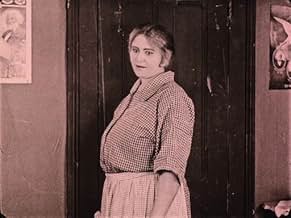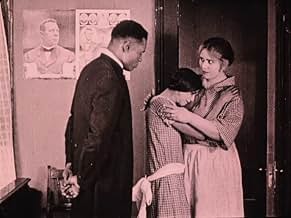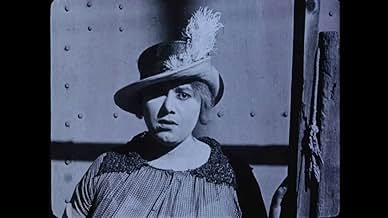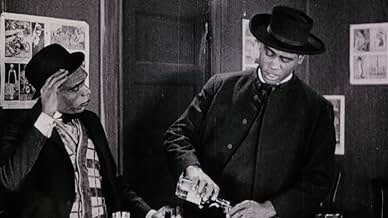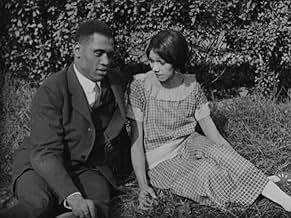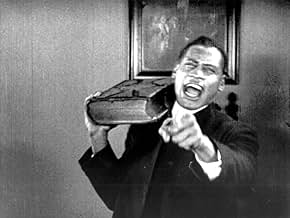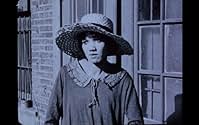IMDb RATING
6.2/10
1.3K
YOUR RATING
A malevolent phony preacher plots to take advantage of a woman from his congregation who happens to be in love with his long-estranged identical twin brother.A malevolent phony preacher plots to take advantage of a woman from his congregation who happens to be in love with his long-estranged identical twin brother.A malevolent phony preacher plots to take advantage of a woman from his congregation who happens to be in love with his long-estranged identical twin brother.
- Awards
- 1 win total
Marshall Rogers
- Speakeasy Proprietor
- (as Marshall Rodgers)
Mercedes Gilbert
- Martha Jane - Her Mother
- (uncredited)
Julia Theresa Russell
- Isabelle - the Girl
- (uncredited)
Featured reviews
A melodrama involving a con man who (somehow) has assumed the role of a preacher (Paul Robeson), and along with an ex-cellmate, sets out to bilk the townspeople out of their money. He's also got his eye on a young woman (Julia Theresa Russell) who just so happens to prefer his kinder twin brother. Robeson turns in a reasonably strong performance in the dual role, even if the character of his twin is somewhat ridiculous. Russell is reasonably good too, and the rape scene told in flashback evokes horror and is well done, probably the film's best.
Overall the film suffers from a weak script, complete with an enormous "it was just a dream" cliché. Accounts vary as to whether the unsatisfying conclusion was due to the considerable problems Micheaux had getting it approved, which unfortunately resulted in a significant hack job. As it is though, it suffers from sloppy editing, has dangling plot points (like the ex-cellmate), and drags on for longer than it should have.
Looking at the film through the lens of today can also be troubling, because the dialogue the characters use is what we think of as stereotypical. As with other films from Micheaux, he unapologetically criticizes the African-American community. Later he would say this:
"I have always tried to make my photoplays present the truth, to lay before the Race a cross-section of its own life, to view the colored heart from close range. My results might have been narrow at times, due perhaps to certain limited situations which I endeavored to portray, but in those limited situations the Truth was the predominant characteristic. It is only by presenting those portions of the Race portrayed in my pictures in the light and background of their true state that we can raise our people to greater heights. I am too much imbued with the spirit of Booker T. Washington to ingraft false virtues upon ourselves, to make ourselves that which we are not. Nothing could be a greater blow to our own progress. The recognition of our true situation will react in itself as a stimulus for self-advancement."
Thus, we have this dialogue, and we have the church congregation falling for the lengthy sermons of a low-life who drinks alcohol out of what looks like a water glass while preaching. Micheaux and other black leaders like W.E.B. DuBois saw religion critically, and as something holding back African-American progress. That's something we also see in the film 'Within Our Gates.' The portrait of ignorance is not flattering, and some black filmgoers were not amused. One at the time likened it to D.W. Griffith's 'Birth of a Nation,' saying "One would expect a white screenwriter to fan the flames of hatred. But what can we say when a black man portrays our people in the same manner?" The white censors were also displeased, seeing in the evil traits of a minister, even a false one, as "sacrilegious, immoral, and would tend to incite to crime."
There is thus a brave honesty here, at least until that ending sequence, and for that I admire Micheaux. He also shows the vulnerability of women in the rape (although it's not the case that she's not believed - in fact it's the opposite, her mother and the congregation believe her and attack the culprit). While rough around the edges, there's a certain power in being a film from a legendary African-American director and featuring the debut of a star, Robeson, who was incredibly multi-faceted and should be better known. Both have done better work, but I'm glad I saw this one, and it's worth checking out.
Overall the film suffers from a weak script, complete with an enormous "it was just a dream" cliché. Accounts vary as to whether the unsatisfying conclusion was due to the considerable problems Micheaux had getting it approved, which unfortunately resulted in a significant hack job. As it is though, it suffers from sloppy editing, has dangling plot points (like the ex-cellmate), and drags on for longer than it should have.
Looking at the film through the lens of today can also be troubling, because the dialogue the characters use is what we think of as stereotypical. As with other films from Micheaux, he unapologetically criticizes the African-American community. Later he would say this:
"I have always tried to make my photoplays present the truth, to lay before the Race a cross-section of its own life, to view the colored heart from close range. My results might have been narrow at times, due perhaps to certain limited situations which I endeavored to portray, but in those limited situations the Truth was the predominant characteristic. It is only by presenting those portions of the Race portrayed in my pictures in the light and background of their true state that we can raise our people to greater heights. I am too much imbued with the spirit of Booker T. Washington to ingraft false virtues upon ourselves, to make ourselves that which we are not. Nothing could be a greater blow to our own progress. The recognition of our true situation will react in itself as a stimulus for self-advancement."
Thus, we have this dialogue, and we have the church congregation falling for the lengthy sermons of a low-life who drinks alcohol out of what looks like a water glass while preaching. Micheaux and other black leaders like W.E.B. DuBois saw religion critically, and as something holding back African-American progress. That's something we also see in the film 'Within Our Gates.' The portrait of ignorance is not flattering, and some black filmgoers were not amused. One at the time likened it to D.W. Griffith's 'Birth of a Nation,' saying "One would expect a white screenwriter to fan the flames of hatred. But what can we say when a black man portrays our people in the same manner?" The white censors were also displeased, seeing in the evil traits of a minister, even a false one, as "sacrilegious, immoral, and would tend to incite to crime."
There is thus a brave honesty here, at least until that ending sequence, and for that I admire Micheaux. He also shows the vulnerability of women in the rape (although it's not the case that she's not believed - in fact it's the opposite, her mother and the congregation believe her and attack the culprit). While rough around the edges, there's a certain power in being a film from a legendary African-American director and featuring the debut of a star, Robeson, who was incredibly multi-faceted and should be better known. Both have done better work, but I'm glad I saw this one, and it's worth checking out.
According to reports, some censoring body objected to the portrayal of a minister as a villain, so producer/director Oscar Micheaux tacked on another ending, and maybe it satisfied a moronic censor, but it ruined the movie.
Since Oscar Micheaux was and is one of my motion-picture heroes, I would never say "don't watch." As I have noted before and will again, that he got to make movies at all is deserving of our admiration, and that they were all, or nearly all, flawed is secondary.
He had imagination and ability, and he had watched enough films by real masters, including D. W. Griffith, to know what to do. Alas, he never had the budget for good editing, or, apparently, for enough rehearsals. So his cutaway shots, his changes of angle, and other aspects of big-budget and skilled movie-making were too often missing.
Still, so what? He made movies!
He raised the money, usually wrote the original story and the script, hired the actors and crews ... and made movies!
In "Body and Soul," he had Paul Robeson. As I said to a friend, somewhat of a waste, using that magnificent voice in a silent film. Fortunately for us, Robeson went on to make talkies, and recordings, and gave many a live concert.
In "Body and Soul," Micheaux had some other talented actors, many of whom honestly deserved acclaim and a chance to perform more often. For whatever reasons, including ignorance on the part of establishment movie-makers, they didn't get that chance. Our loss, as well as the performers'.
This presentation, shown on TCM 20 February 2022, was further marred by an abrasive noise in place of a music score. It wasn't 1920s-era jazz, just percussive noise. Very distracting.
Never mind. Any time an Oscar Micheaux movie is available, I'll be watching, if at all possible. And I urge you to watch also.
Since Oscar Micheaux was and is one of my motion-picture heroes, I would never say "don't watch." As I have noted before and will again, that he got to make movies at all is deserving of our admiration, and that they were all, or nearly all, flawed is secondary.
He had imagination and ability, and he had watched enough films by real masters, including D. W. Griffith, to know what to do. Alas, he never had the budget for good editing, or, apparently, for enough rehearsals. So his cutaway shots, his changes of angle, and other aspects of big-budget and skilled movie-making were too often missing.
Still, so what? He made movies!
He raised the money, usually wrote the original story and the script, hired the actors and crews ... and made movies!
In "Body and Soul," he had Paul Robeson. As I said to a friend, somewhat of a waste, using that magnificent voice in a silent film. Fortunately for us, Robeson went on to make talkies, and recordings, and gave many a live concert.
In "Body and Soul," Micheaux had some other talented actors, many of whom honestly deserved acclaim and a chance to perform more often. For whatever reasons, including ignorance on the part of establishment movie-makers, they didn't get that chance. Our loss, as well as the performers'.
This presentation, shown on TCM 20 February 2022, was further marred by an abrasive noise in place of a music score. It wasn't 1920s-era jazz, just percussive noise. Very distracting.
Never mind. Any time an Oscar Micheaux movie is available, I'll be watching, if at all possible. And I urge you to watch also.
A very moving film for its time.I'm a big Paul Robeson fan and I'm glad TCM shows a lot of films with all Black casts.I think it should be shown along with the 1929 film "Hallelujah".It also has an all Black cast and has religion as its theme but it's not a silent film.This film ran a little too long but I never stopped watching.Touchy subject matter even today.Right on point even today!Even though Robeson found fame who knows what talent the others had that skin color stopped from them also becoming well known.That's why I love these films.The Black Church must have shunned this type of film back them and the actors couldn't have had an easy time of it.I'd call this a silent soap opera.The mother really loved her daughter a whole lot.Mercy!The daughter was the ultimate tragic figure.The Minister.One word-Sinister!
Of course, we will never have a chance to see a director's cut of Body and Soul. Were that possible, then we would certainly see a completely different movie.
Many of the obvious flaws in the film were due to Oscar Micheaux's difficulties in getting the production past the censors. Despite the fact that the convict is acting as a minister, the act of showing one in a minister's robes drinking was too much for the time.
Today it would be a matter of getting several million dollars from the studio and re-shooting sections of the movie. Oscar Micheaux did not have this luxury. This meant that he had to use the little money available to him to change a completely unacceptable movie into one that would help pay the bills.
The only way to do this was to add an ending that corrected everything, and cut the sections of drinking, which happened to be crucial to the story. This resulted not only in a lack of explanation for the story and very clumsy movements from one scene to the next.
The drinking scenes have been replaced, which lengthens the film to eight of its original nine reels. This certainly helps, but the alternative ending remains. I am thinking that the director's cut would not have included this and Oscar Micheaux would have a much better movie.
Of course, Paul Robeson drives this movie (his only silent appearance), and moviegoers now know of his brilliant voice. Sans this, his penetrating eyes showed the emotion that must have matched his stage performances, which makes this a movie that can be recommended.
Many of the obvious flaws in the film were due to Oscar Micheaux's difficulties in getting the production past the censors. Despite the fact that the convict is acting as a minister, the act of showing one in a minister's robes drinking was too much for the time.
Today it would be a matter of getting several million dollars from the studio and re-shooting sections of the movie. Oscar Micheaux did not have this luxury. This meant that he had to use the little money available to him to change a completely unacceptable movie into one that would help pay the bills.
The only way to do this was to add an ending that corrected everything, and cut the sections of drinking, which happened to be crucial to the story. This resulted not only in a lack of explanation for the story and very clumsy movements from one scene to the next.
The drinking scenes have been replaced, which lengthens the film to eight of its original nine reels. This certainly helps, but the alternative ending remains. I am thinking that the director's cut would not have included this and Oscar Micheaux would have a much better movie.
Of course, Paul Robeson drives this movie (his only silent appearance), and moviegoers now know of his brilliant voice. Sans this, his penetrating eyes showed the emotion that must have matched his stage performances, which makes this a movie that can be recommended.
Body and Soul is an interesting film. Paul Robeson makes a powerful debut in this film about an escaped prisoner who blends into a small community as a beloved pastor. This film is an interesting period piece and was written, directed, and starred African-Americans in an era where that sort of thing wasn't done. Audiences today would be shocked at the stereotypical performances of the supporting cast and would be shocked that an African-American made this film. Well worth seeing for movie buffs. Robeson gives a great and powerful performance.
Did you know
- TriviaFilm debut of Paul Robeson.
- GoofsMother Martha Jane looks through her Bible for the saved money to show it to the sisters, but it's missing. She leaves the book on the table and while searching through some drawers, three shots of the sisters show no book on the table. When the mother returns to the table, the book is back.
- Quotes
Yello-Curley' Hinds - the Phony Reverend's Former Jailmate: I tell you that I was not seekin' you out, but dropped off here to find girls for 'Cotton Blossom's Shoulder Shakers' - - and this little Isabelle - - she appeals to muh!
- Alternate versionsRaymond Rohauer, Inc. copyrighted a restored version in 1979 with a music track and new credits. The music was composed and performed by Lee Erwin and was recorded at Carnegie Hall Cinema, New York. It's running time is 83 minutes.
- ConnectionsFeatured in Black Shadows on a Silver Screen (1975)
- How long is Body and Soul?Powered by Alexa
Details
- Runtime1 hour 42 minutes
- Sound mix
- Aspect ratio
- 1.33 : 1
Contribute to this page
Suggest an edit or add missing content

